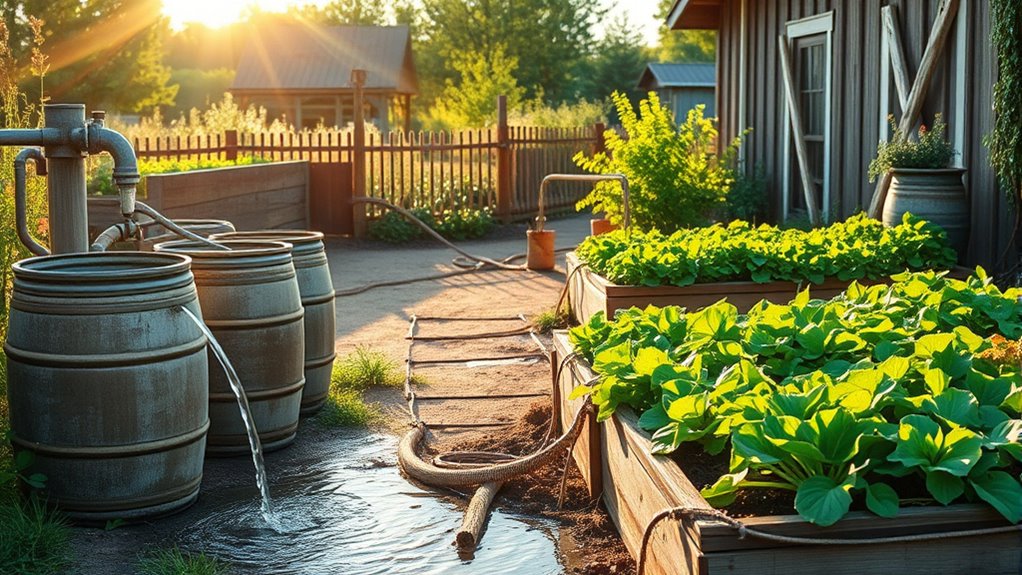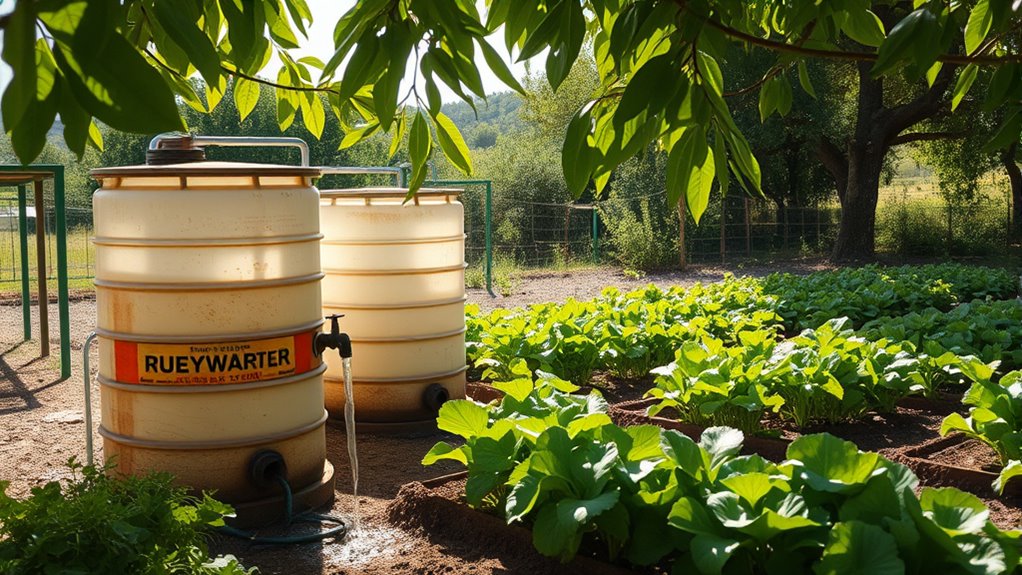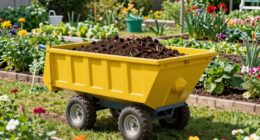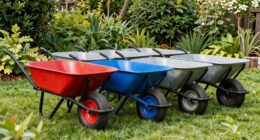To safely reuse greywater on your small farm, make certain you use only eco-friendly soaps and avoid harsh chemicals. Properly filter and compost greywater to reduce contaminants before irrigating non-food plants or trees. Inspect your system regularly for leaks and blockages, and maintain filters to keep the water clear. Be cautious about applying greywater directly to edible parts of plants unless it’s properly treated. Continue exploring these practices to maximize safety and benefits.
Key Takeaways
- Combine greywater with rainwater harvesting to diversify water sources and reduce reliance on freshwater.
- Use composting techniques to filter greywater, breaking down contaminants before applying to plants.
- Employ eco-friendly soaps and avoid harsh chemicals to prevent soil and plant damage.
- Regularly inspect and maintain system components to ensure safe and efficient greywater reuse.
- Limit greywater use to non-edible plants or properly treated edible crops to minimize health risks.

If you’re looking for sustainable ways to maximize water use on your small farm, greywater reuse offers a practical solution. Greywater, which is the relatively clean wastewater from sinks, showers, and laundry, can be repurposed to water your crops and reduce your reliance on freshwater sources. To do this effectively and safely, you need to understand how to implement proper reuse practices. One essential step is integrating rainwater harvesting into your farm’s water management system. Collecting rainwater from rooftops or other surfaces provides a clean, natural source of water that complements greywater reuse efforts. When combined with greywater systems, rainwater harvesting creates a diversified water supply, reducing strain on local water sources and making sure your plants receive adequate moisture during dry periods.
To safely reuse greywater, it’s vital to pay attention to composting techniques that can help treat and filter wastewater before it reaches your plants. Composting not only improves soil health but also helps break down contaminants in greywater, making it safer for reuse. You might consider setting up composting systems that include organic matter like straw, leaves, or manure, which aid in biological filtration. When greywater passes through these composting layers, harmful pathogens and solids are reduced, creating a safer environment for your crops. Remember, the key is to avoid using greywater on edible parts of plants that are directly consumed raw, such as leafy greens or herbs, unless it’s properly treated. Instead, you can use it for irrigation of trees, ornamentals, or non-food crops.
Another important practice is maintaining your greywater system to prevent health risks. Regularly inspecting pipes, filters, and composting beds ensures there are no leaks or blockages and that the microbial activity remains effective. Using eco-friendly soaps and detergents also minimizes chemical buildup in the soil, promoting healthier plant growth. Keep in mind that greywater shouldn’t contain harsh chemicals, bleach, or pharmaceuticals, as these can harm beneficial soil microbes and plants. Additionally, understanding the importance of contrast ratio and how it affects water clarity can help optimize your greywater system to reduce suspended solids and improve filtration. When planning your reuse system, consider the layout carefully to avoid water stagnation or runoff that could contaminate groundwater or neighboring areas.
Frequently Asked Questions
Can Greywater Be Used for Irrigating Edible Root Crops?
You can use greywater for irrigating edible root crops if you guarantee proper greywater treatment. Root crop safety depends on removing pathogens and contaminants, so treating greywater effectively reduces risks. Always use filtered and disinfected greywater, avoid harsh chemicals, and apply it directly to the soil rather than the edible parts. By following these practices, you can safely reuse greywater and protect your crops and consumers.
What Are the Health Risks Associated With Greywater Reuse?
When you reuse greywater, you face contamination risks that can lead to pathogen transmission. These health risks include the spread of bacteria, viruses, and parasites if greywater isn’t properly treated or managed. To stay safe, you should avoid using greywater on edible crops that contact the soil directly or consume raw, and always implement proper filtration and disinfection methods. This helps minimize health hazards for you and your farm’s consumers.
How Does Greywater Impact Soil Quality Over Time?
Did you know that over time, greywater can substantially impact your soil? When reused improperly, it can lead to soil contamination and nutrient buildup, which might harm plant health and reduce fertility. As you reuse greywater, you should monitor soil conditions regularly. Without proper management, the accumulation of salts and nutrients can degrade your soil, making it less productive and potentially causing long-term damage to your farm ecosystem.
Are There Specific Plants That Thrive With Greywater Irrigation?
You’ll find that certain plants have better compatibility with greywater irrigation, especially those that thrive in high water retention environments. Vegetables like tomatoes and herbs such as basil often do well, but avoid plants sensitive to salts or chemicals. To maximize success, observe how your plants respond and adjust your greywater system accordingly, ensuring ideal plant health and soil quality over time.
What Are the Costs Involved in Implementing Greywater Systems?
When considering greywater systems, you should do a thorough cost analysis to understand the total expenses. Installation expenses vary based on system complexity and property size, but expect to spend on filters, pumps, and plumbing. Additional costs can include permits and ongoing maintenance. While initial investments may seem high, greywater reuse can reduce water bills over time, making it a cost-effective choice for small farms.
Conclusion
By embracing greywater reuse, you can boost your farm’s sustainability and cut costs, all while protecting your land and water sources. Think of it as harnessing the wisdom of old pioneers—like Benjamin Franklin—who understood the value of resourcefulness. Just remember, with careful practices and proper treatment, you can turn today’s water challenges into tomorrow’s farming victories. So, take the reins, be mindful, and let greywater work for you—because every drop counts in your sustainable journey.










